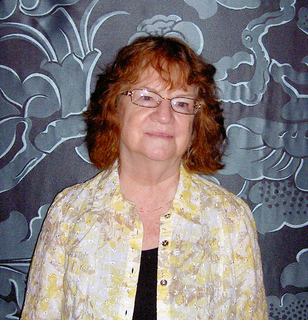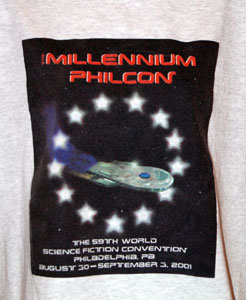Related Research Articles

The Encyclopedia of Science Fiction (SFE) is an English language reference work on science fiction, first published in 1979. It has won the Hugo, Locus and British SF Awards. Two print editions appeared in 1979 and 1993. A third, continuously revised, edition was published online from 2011; a change of web host was announced as the launch of a fourth edition in 2021.

David Rowland Langford is a British author, editor, and critic, largely active within the science fiction field. He publishes the science fiction fanzine and newsletter Ansible, and holds the all-time record for most Hugo Awards, with a total of 29 wins.

Patricia Anne McKillip is an American author of fantasy and science fiction. She has been called "one of the most accomplished prose stylists in the fantasy genre", and writes predominantly standalone fantasy novels. Her work has won her numerous awards, including the World Fantasy Award for Lifetime Achievement in 2008.
Mike Glyer is both the editor and publisher of the long-running science fiction fan newszine File 770. He has won the Hugo Award 12 times in two categories: File 770 won the Best Fanzine Hugo in 1984, 1985, 1989, 2000, 2001, 2008, 2016 and 2018. Glyer won the Best Fan Writer Hugo in 1984, 1986, 1988, and 2016. The 1982 World Science Fiction Convention (Worldcon) committee presented Glyer a special award in 1982 for "Keeping the Fan in Fanzine Publishing."
File 770 is a long-running science fiction fanzine, newszine, and blog site published/administered by Mike Glyer. It has been published every year since 1978, and has won a record eight Hugo Awards for Best Fanzine, with the first win in 1984 and the most recent in 2018.
SF Site is an online science fiction and fantasy magazine edited by Rodger Turner. It is among the oldest of websites dedicated to science fiction and primarily publishes book reviews. It has won the Locus Award and received nominations for the Hugo and World Fantasy Awards. SF Site also provides web hosting services, and was instrumental in the online presence of major magazines such as Analog, Asimov's, F&SF and Interzone.
Locus: The Magazine of The Science Fiction & Fantasy Field, is an American magazine published monthly in Oakland, California. It is the news organ and trade journal for the English language science fiction and fantasy fields. It also publishes comprehensive listings of all new books published in the genres. The magazine also presents the annual Locus Awards. Locus Online was launched in April 1997, as a semi-autonomous web version of Locus Magazine.
Steven Earl Popkes is an American science fiction writer, known primarily for his short fiction. He was nominated for the Nebula and Sturgeon Awards for the short story "The Color Winter" (1988).
Janet Kagan was an American author. Her works include two science fiction novels and two science fiction collections, plus numerous science fiction and fantasy short stories that appeared in publications such as Analog Science Fiction and Fact and Asimov's Science Fiction. Her story "The Nutcracker Coup" was nominated for both the Hugo Award for Best Novelette and the Nebula Award for Best Novelette, winning the Hugo.

Science-Fiction Handbook, subtitled The Writing of Imaginative Fiction, is a guide to writing and marketing science fiction and fantasy by L. Sprague de Camp, "one of the earliest books about modern sf." The original edition was published in hardcover by Hermitage House in 1953 as a volume in its Professional Writers Library series. A revised edition, by L. Sprague de Camp and Catherine Crook de Camp, titled Science Fiction Handbook, Revised, was published in hardcover by Owlswick Press in 1975 and as a trade paperback by McGraw-Hill in 1977. An E-book version of the revised edition was published by Gollancz's SF Gateway imprint on April 30, 2014.

The 59th World Science Fiction Convention (Worldcon), also known as The Millennium Philcon, was held on 30 August–3 September 2001 at the Pennsylvania Convention Center and Philadelphia Marriott Hotel in Philadelphia, Pennsylvania, United States.
The 70th World Science Fiction Convention (Worldcon), also known as Chicon 7, was held on 30 August–3 September 2012 at the Hyatt Regency Chicago in Chicago, Illinois, United States.
The 47th World Science Fiction Convention (Worldcon), also known as Noreascon 3, was held on 31 August–4 September 1989 at the Sheraton-Boston Hotel, Hilton Hotel, Boston Park Plaza, and the Hynes Convention Center in Boston, Massachusetts, United States.
The 54th World Science Fiction Convention (Worldcon), also known as L.A.con III, was held on 29 August–2 September 1996 at the Hilton Anaheim, Anaheim Marriott, and the Anaheim Convention Center in Anaheim, California, United States.
Tor.com is an online science fiction and fantasy magazine published by Tor Books, as well as an imprint of Tom Doherty Associates, a division of Macmillan Publishers. It publishes articles, reviews, original short fiction, re-reads and commentary on speculative fiction.
"Exhalation" is a science fiction short story by American writer Ted Chiang, about the Second Law of Thermodynamics. It was first published in 2008 in the anthology Eclipse 2: New Science Fiction and Fantasy, edited by Jonathan Strahan. In 2019, the story was included in the collection of short stories Exhalation: Stories.

Aliette de Bodard is a French-American speculative fiction writer. She is of French and Vietnamese descent, born in the US, and grew up in Paris. French is her mother-tongue, but she writes in English. A graduate of École Polytechnique, she works as a software engineer specialising in image processing and is a member of the Written in Blood writers group.

Terry Carr's Best Science Fiction of the Year is an anthology of science fiction short stories edited by Terry Carr, the fourteenth volume in a series of sixteen. It was first published in paperback by Tor Books in July 1985, and in hardcover and trade paperback by Gollancz in October of the same year, under the alternate title Best SF of the Year #14.

This is a complete list of works by American fantasy author Robin Hobb, the pen name of Margaret Astrid Lindholm Ogden.

An Informal History of the Hugos is a 2018 non-fiction book by Welsh-Canadian author Jo Walton. It examines whether the Hugo award nominees were the best five SF and fantasy books of the year, using as reference shortlists from other awards in the genre. It was well-received, and was nominated for the 2019 Hugo and Locus Awards, in the non-fiction category.
References
- 1 2 3 Nicholls, Peter; Langford, David (January 4, 2021). "Locus". In Clute, John; et al. (eds.). The Encyclopedia of Science Fiction (3rd ed.). Gollancz.
- ↑ Glyer, Mike (August 20, 2010). "Light 10 Candles for Locus Index to SF Awards". File 770 .
- ↑ Kleckner Keefe, Karen (September 23, 2011). "Web Crush of the Week: Locus Online". The Booklist Reader . American Library Association. Archived from the original on June 7, 2020.
- ↑ "Science Fiction & Fantasy: A Research Guide: Biographical Sources". Cornell University Library . April 29, 2021. Retrieved September 11, 2021.
- ↑ "Introduction". The Locus Index to SF Awards. Locus Publications. June 20, 2000. Archived from the original on August 18, 2000.
- ↑ Walton (2018), p. 18, chpt. "1953".
- ↑ "Intro". Mark R. Kelly (personal website). Retrieved September 11, 2021.
- 1 2 Walton (2018), p. 571, chpt. "Conclusion".
- ↑ Dozois (2011), p. xxii, chpt. "Summation: 2010".
- 1 2 "In Praise of.. The Locus Index to Science Fiction Awards". SF Gateway . Orion Publishing Group. March 13, 2013.
- ↑ "2002 Hugo Awards". The Hugo Awards . World Science Fiction Society. July 26, 2007. Retrieved September 11, 2021.
- 1 2 "Introduction". Science Fiction Awards Database. Locus Science Fiction Foundation . Retrieved September 11, 2021.
- ↑ Glyer, Mike (July 23, 2014). "Never-Winner Land". File 770 .
- ↑ Glyer, Mike (December 11, 2018). "Pixel Scroll 12/11/18 For The World Is Hollow And I Have Scrolled The Pixel". File 770 .